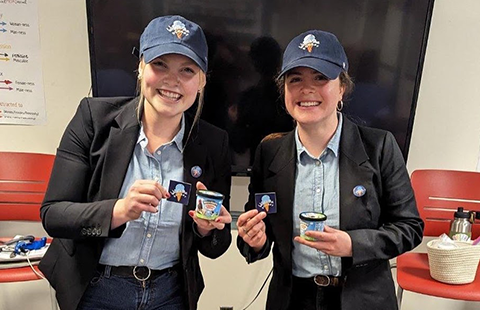What's the Scoop?

Hannah Falcone, left, and Kate Moscouver, right, serve up ice cream after a research session.
Why did you choose UNH and the RMP graduate program?
Hannah: I came to realize I was passionate about community event planning as I was finishing up high school. I had heard about the UNH Recreation Management and Policy undergraduate program from a friend and it sounded like the perfect opportunity to explore public, private, and nonprofit sectors of recreation careers. I loved my undergraduate years in the program and am having a great experience in the Recreation Administration graduate program thanks to our wonderful professors, the values of the program, my WONDERFUL research partner (Kate) and my advisor (Dr. Cindy Hartman) who keep me going. Currently, I hope to become a Parks and Recreation Director somewhere in New England, and I see the research experience I have attained in the M.S. Rec Administration program as directly beneficial to this career goal.
Kate: After studying Outdoor Recreation and Education at Ohio University for my undergraduate degree, I knew I wanted to explore other approaches to the work both academically and in the field. I discovered the research of Dr. Jayson Seaman and made it my goal to work with him as a graduate research assistant. After a few false starts and the COVID interference, I finally made my way to UNH. I was drawn in by the small town and campus, and the proximity to the coast, mountains, and lakes.
Tell us about the "What's the Scoop?" research project and why it is important for NH youth, families, and communities.
New Hampshire has some unique characteristics related to outmigration of its 18- to 24-year-old population. “What’s the Scoop?” seeks to understand how young people decide what to do after high school, through the perspective of those currently in that decision-making process. We explore the relative influence of communities, families, leisure/out-of-classroom experiences, and society at large on their decisions. Beyond this, our project will provide insight into what youth are searching for in terms of satisfying recreation and quality of life experiences. This will help us understand how we can provide satisfying and happy lives for young people growing up in NH, and what they need in order to stay.
Our research project consists of two pieces: our focus groups and our individual interviews. We travel around the state, working with NH youth groups, high schools, and career and technical centers, to visit groups of 14- to 20-year-old residents. We affectionately dubbed the project “What’s the Scoop? On Life in NH!” with a nod to the ice cream we present to participants at the end of each session.
What have you learned about engaging NH youth in the research process?
Engaging NH youth in this interactive research process has been both energizing and challenging. Each time we meet with a group or conduct an interview, we are reminded of the importance of the information we are gathering and the impact this will have on future generations. We have enjoyed implementing our experiential education leadership styles in a research setting, and seeing how the fun, authentic process of mutually constructing data with our participants has helped to achieve rapport and honest responses from youth across the state.
What are the next steps for your research, including areas for dissemination and sharing?
After we conclude our data collection process, we have two main objectives.
First, we are collaborating with the nonprofit organization New Hampshire Stay Work Play, whose research served as a model for our approach, to create a detailed infographic that highlights what youth like about NH, what they wish was different, and ideas they have for change.
We will also each be writing theses based on our research. Kate’s will focus on how youth’s recreational experiences influence their future plans, and Hannah’s thesis will center around how youth narrate their participation in recreation and community engagement opportunities and how those relate to positive youth development in the state.
Thanks for talking with us, Hannah and Kate!